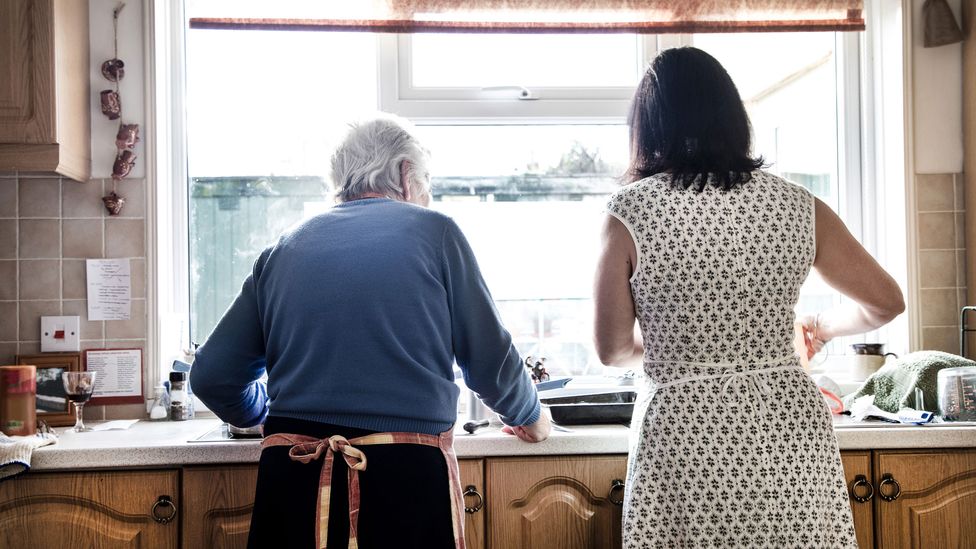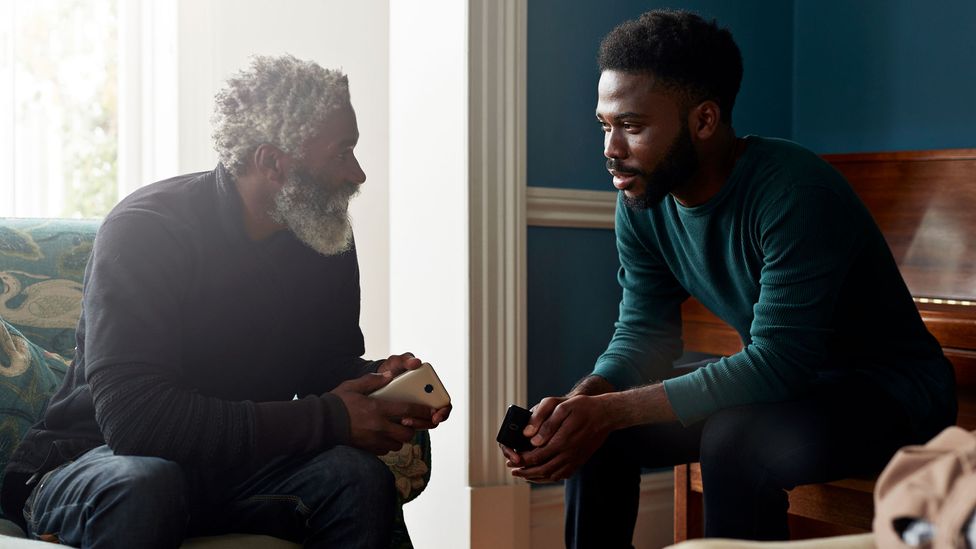After Returning to My Parents
The adult 'boomerang kids' moving home to their parents
(Image credit:
Getty Images
)

With costs of living increasing, a 'boomerang' flow of moving back in with parents could be the norm, not the exception, for people in their 20s and 30s.
I
In early March 2020, Sheridan Cake, xxx, had merely finished a year abroad in Marseilles, France, every bit a volunteer English language instructor to refugees. She flew abode to Jacksonville, Florida, to spend fourth dimension with her maternal grandparents – her grandfather was recovering from health problems at the time. Her programme was to stay a few months to assistance treat them while also saving money, paying off some student debt and credit card bills before returning abroad.
And then, the pandemic hit. "It was kind of a spiral," says Block.
In commutation for living rent-free, she helped drive her grandparents to appointments, ran errands, cooked and did chores around the firm. She ended up staying nearly two years. "I was able to save enough money to pay off all those debts that I had, to finance a car and then ultimately to movement out," she explains. It was beneficial financially, she says, and good to be close to family, but it required her to adjust her ideas of what adulthood should look like.
Block is amongst a growing group of 'boomerang kids' – developed children who return to their parents or grandparents' homes afterward moving out. This group of adults is on the rise – and not but because of the pandemic. In July 2020, 52% of young adults in the US resided with one or both of their parents, according to a Pew Research Center analysis – the highest percentage the United States has seen since the end of the Great Low, in 1940. In the U.k., the proportion of single, child-costless 20-to-34-yr-olds living with their parents went upward 55% between 2008 to 2017, according to inquiry from Loughborough University.
In Western cultures peculiarly, moving abroad from home has traditionally been considered a crucial step in becoming an independent adult. Just as the number of boomerang kids continues to ascension in countries such every bit the U.s., UK and Canada, this may be gear up to modify – and with it, our notion of what the stages of developed independence look similar.
An upward boom
When she moved in with her grandparents, Block noticed she was far from alone amongst her peers.
"I institute that a lot of friends, and even some dates I went on, were kind of in the same gunkhole," she says. "I had met one guy [on a engagement] who moved from San Francisco back in with his mom in Jacksonville. That's simply a reality at present, to practice any you've got to do to save money."

Later on returning from pedagogy abroad in France, Sheridan Block, 30, moved back home with her family unit during the pandemic (Credit: Courtesy of Sheridan Block)
Family unit Tree
This story is function of BBC's Family Tree series, which examines the issues and opportunities parents, children and families face today – and how they'll shape the world tomorrow. Coverage continues on BBC Future.
In that location are many reasons for young people to move back domicile, says Joanne Hipplewith, family therapist at the Plant for Family Therapy in London. The main reason is the high cost of living in major cities, though university tuition is another factor in the United states of america and Britain.
"There is a tendency to staying at habitation longer, because everything is so expensive," says Hipplewith. Staying home, for many, means financial support from family unit as they set up for avant-garde degrees or starting a career. And information technology's becoming increasingly normal: "[Young people are] prepared to go back home," says Hipplewith.
Though the 'boomerang' stage has been on the ascent for at least the last decade, the pandemic has added a few new contributing factors: many who planned to go away for college could non – university campuses airtight beyond the world – and others who might take otherwise moved for a task after higher delayed leaving domicile because in-role work has not been available.
For many, the boomerang phase is temporary. But it still may last many months – or even years, like it did for Cake – to enable boomerangers to pay off student debt, save for a down payment or institute themselves in a career without meantime worrying about high rents, tuition and student debt.
"Information technology's temporal – a i-year, ii-year or five-year plan," says Jenna S Abetz, acquaintance professor of communication at the College of Charleston, Us. "This is only a transition affiliate."
Redefining the milestones of adulthood
For many, a render home after living away – or directly afterward academy – can feel like a regression and loss of recently won independence.
"Yous learn to become an adult [in university]," says Hipplewith. "You lot accept friends. Y'all're doing what you want to do. So, it tin exist really quite devastating because you lot're coming back nether someone else'southward rules."
Boomeranging forces adults in their 20s and 30s to face assumptions near independence, and this can come with anxiety. Beyond feeling they 'regressed' by moving habitation, many adult children returning home feel a trickle-down issue to other life milestones. Abetz says that 20- and 30-somethings living with their parents are getting married later and also delaying having children, which tin can leave them feeling even more "behind".
"I expected something very different from adulthood," agrees Block. By her 30s, she says, she had once idea she'd have a successful career, own a habitation, be married and accept a family unit, along with a solid savings and retirement plan. "Unfortunately, that didn't happen," she says. At times, living with her grandparents made her feel "similar a failure not having those adulthood dreams checked off".
Still, in that location are benefits to boomeranging, say experts. Many of these adults are finding an increased ability to practice work they find meaningful, rather than take a job that simply pays the bills, says Abetz. During Covid-19, this has also meant some boomerangers have been able to choose jobs with lower risk factors, though this is largely dependent on their socioeconomic situation.
Socially, boomerang kids also have an opportunity to strengthen relationships with their parents at a time when they typically would have been establishing ties with new friends. It's an unexpected "opportunity for common support and closeness with families," says Abetz, that could atomic number 82 to boomerang kids developing strong family support networks in the long-term. "Parents sometimes like to have kids back dwelling for a niggling while," says Abetz. "They view that equally a special time they wouldn't necessarily take gotten."

For some boomerang kids, moving back in with their parents means delaying life milestones – merely information technology tin can also bring them closer to their families (Credit: Getty Images)
Another new normal
Abetz and Hipplewith both believe this is not just a pandemic-induced trend, and foresee an increasing number of adults bunking with parents as costs of living go along to rise. In the time to come, subsequently moving abroad for academy or college, says Abetz, life paths may exist a petty "less linear. It might exist back and forth. Information technology might be, after higher, yous'll be habitation for 6 months or a couple of years".
Hipplewith hopes that as boomerang stages become more than common in Western cultures, young adults volition feel less pressure to conform to societal expectations of going to university, moving out and finding a job. Hipplewith encourages young people to view a return to habitation, or remaining dwelling house, as "informed conclusion-making". She says, "Let'due south move abroad or de-link condign an adult with the deed of moving away."
And some research indicates perceptions have already begun to change. Cake agrees boomerang moves are a new reality for her generation, and one that can potentially re-frame an unhelpful mindset.
"When I was traveling, my friends from other countries, specially those where family unit is super close, similar in Asia, would say how funny information technology was that Americans are then obsessed with moving out at xviii. Even my grandma, who is from the Philippines, would make comments about it," she says.
"I recall my generation is learning to be OK with the thought that non everyone's path is meant to await the same, and success is all most perception," continues Block. "Adulthood is really only being old plenty to have responsibilities and pay bills; that doesn't go away if y'all move in with parents again."
Source: https://www.bbc.com/worklife/article/20220208-the-adult-boomerang-kids-moving-home-to-their-parents
Post a Comment for "After Returning to My Parents"